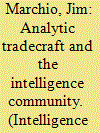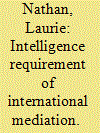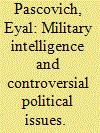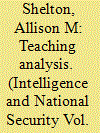| Srl | Item |
| 1 |
ID:
131106


|
|
|
|
|
| Publication |
2014.
|
| Summary/Abstract |
The emphasis and visibility afforded analytic tradecraft in the Intelligence Community's analytic production has fluctuated throughout its existence. The explanation for this intermittent emphasis on tradecraft may lie in changes in consumer preferences and collection means, the role played by individual tradecraft advocates, and the lack of an intelligence failure matching the severity of 9/11 and the absence of weapons of mass destruction in Iraq. Both failures served as a forceful reminder that while strong analytic tradecraft does not guarantee 'getting a judgment right', it increases the likelihood that the assessments produced are transparent, relevant, and rigorous.
|
|
|
|
|
|
|
|
|
|
|
|
|
|
|
|
| 2 |
ID:
131107


|
|
|
|
|
| Publication |
2014.
|
| Summary/Abstract |
The 1974 Cypriot War divided the island of Cyprus into two parts with a narrow demilitarized zone (DMZ) between the opposing Greek Cypriot and Turkish forces. The volatility and violence in this zone, called the 'Green Line', necessitated a constant UN peacekeeping presence that was achieved mainly with manned observation posts (OPs). About 150 of these posts were established by 1975 to maintain stability and prevent flare-ups, including any lethal exchanges between the two sides. By the early 1990s, many of the countries contributing peacekeepers to the United Nations Peacekeeping Force in Cyprus (UNFICYP) had become tired of the stalemate and the lack of progress in negotiations (peacemaking), so they withdrew their troops from the force. This necessitated a reduction in the number of constantly manned OPs from 51 in 1992 to 21 in mid-1993. Further downsizing of UNFICYP by the UN Security Council in 2004 gave rise to a new approach to monitor the DMZ and produce actionable intelligence. Cameras were installed in hot-spots in the Nicosia DMZ and more responsive patrols were introduced as part of the new 'concentration with mobility' concept. This was the first time a UN peace operation used unattended cameras to monitor a demilitarized zone. This article examines the UN's difficulties and successes using the remote cameras, especially during important incidents. Other technologies that aided UNFICYP are also reviewed for lessons that might assist an under-equipped United Nations in its watchkeeping function.
|
|
|
|
|
|
|
|
|
|
|
|
|
|
|
|
| 3 |
ID:
131108


|
|
|
|
|
| Publication |
2014.
|
| Summary/Abstract |
This article explores the intelligence requirement of international mediation, a topic that is ignored in both the literature on conflict resolution and the literature on intelligence. A mediator's strategies and tactics ought to be informed by a deep understanding of the parties' internal calculations about the conflict and its resolution. Intelligence is needed to gain this understanding because the parties typically do not reveal their sensitive deliberations to outsiders. United Nations mediation teams should have a monitoring and analysis unit that endeavours to meet this need and reduce the ignorance that commonly afflicts international mediation.
|
|
|
|
|
|
|
|
|
|
|
|
|
|
|
|
| 4 |
ID:
131109


|
|
|
|
|
| Publication |
2014.
|
| Summary/Abstract |
Contrary to intelligence services in other democracies worldwide, the activity of the Israeli Directorate of Military Intelligence, AMAN, is not merely centered around collection and research regarding military intelligence matters. Instead, AMAN covers the majority of intelligence activity arenas, including intelligence regarding state-related issues. This field of activity presents a situation where AMAN's officers, and predominantly, its research division, are compelled to deal with sensitive issues embedded well within Israeli political and public controversy. This is commonly illustrated in the field of 'Intelligence for Peace' in general and more specifically in the Palestinian arena. Intelligence research surrounding the question of Palestinian commitment to peace throughout the Oslo Process and following the onset of the al Aqsa Intifada - activity classified as 'Intelligence on Intentions' - placed AMAM at the heart of political debate in Israel and resulted in bitter internal disagreements in AMAN as well as tensions between the intelligence service and the political leadership. Throughout the years, numerous recommendations have been repeatedly voiced to end AMAN's monopoly over Israel's national intelligence assessment (including aspects of intelligence regarding state-related issues). These recommendations were based predominantly on hindsight evaluations, such as AMAN's repeated failures in intelligence assessments. This paper calls for gradual termination of AMAN's activity of intelligence regarding state-related issues, in light of its contradiction with the appropriate military-political separation in a democratic society. Moreover, it places AMAN at the heart of the political debate dividing Israeli society.
|
|
|
|
|
|
|
|
|
|
|
|
|
|
|
|
| 5 |
ID:
131110


|
|
|
|
|
| Publication |
2014.
|
| Summary/Abstract |
A common substantive topic in intelligence studies is the analysis process. The addition of active-learning techniques to reinforce key concepts like competitive analysis, 'wheat' versus 'chaff', and the different 'ints' of intelligence can be an important supplement to existing teaching methods. Moreover, a deeper appreciation of the intelligence analysis process is likely to be best achieved through simulation learning. Drawing on the growing literature that recognizes active learning and simulations as important pedagogical tools, this teaching note presents an original active-learning simulation for the college-level intelligence studies classroom in which students face an analysis challenge that highlights different components of the analysis process. This simulation increases appreciation for intelligence analysis and serves as a student-friendly method for enhancing intelligence studies pedagogy.
|
|
|
|
|
|
|
|
|
|
|
|
|
|
|
|